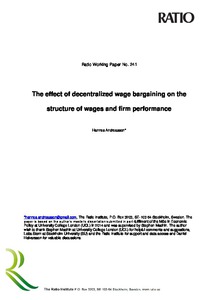The effect of decentralized wage bargaining on the structure of wages and firm performance
"This paper analyses how decentralised wage bargaining affects wage levels and the structure of wages as well as the impact on firm performance. By using unique employer-employee matched data for Sweden 2007 and 2010, the paper presents new evidence on the collective bargaining premium in Swede...
| Main Author: | |
|---|---|
| Institution: | ETUI-European Trade Union Institute |
| Format: | TEXT |
| Language: | English |
| Published: |
Stockholm
2014
The Ratio Institute |
| Subjects: | |
| Online Access: | https://www.labourline.org/KENTIKA-19115570124919337529-The-effect-of-decentralized-wa.htm |
| Summary: | "This paper analyses how decentralised wage bargaining affects wage levels and the structure of wages as well as the impact on firm performance. By using unique employer-employee matched data for Sweden 2007 and 2010, the paper presents new evidence on the collective bargaining premium in Sweden and the linkages between decentralised bargaining and firm performance. By differentiating between decentralised, two-tiered and centralised collective wage bargaining the methodologies of Card and De La Rica (2006); Dahl, le Maire, and Munch (2013); Guertzgen (2014); Gürtzgen (2007); Jakubson (1991) are adopted and adjusted using pooled OLS, first difference OLS, and quantile regressions. Variation in individual worker’s bargaining regime is exploited for identification of the effect of decentralisation. Results indicate that a large share of the wage premium associated with decentralised and two-tiered bargaining is due to systematic selection/sorting into those regimes. Models that take into account individual and firm unobserved heterogeneity indicate that the wage premium associated with decentralised wage bargaining is around 5-7.5% and 0.7-4.1% for two-tiered bargaining. When examining the effect on the wage structure, results indicate that decentralised and two-tiered bargaining compresses the wage structure by awarding relatively higher wage premiums to low-wage earners, in particular in decentralised regimes. At the same time, no evidence is found of higher returns to education in either regime, but both regimes are associated with higher returns to experience than centralised bargaining. Lastly, unique evidence is found of a positive linkage between the level of decentralisation at the firmlevel and value added per employee and firm productivity. This is a novel contribution to the literature that has not yet considered the impact of decentralised wage bargaining on firm performance. Thus there is evidence that the level at which bargaining takes place influences both wage levels and wage structure as well as firm performance." |
|---|---|
| Physical Description: | 43 p. Digital |

